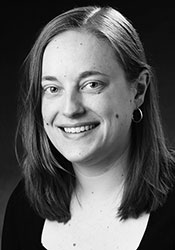
Prof. Nicole (“Nikki”) Lovenduski is an ideal recipient of the AGU Ocean Sciences Early Career Award. She is a bright, motivated, talented scientist with an extraordinarily good sense of what is important and where she wants to go. She is an original thinker and exhibits endless enthusiasm for her research. In addition to her outstanding record of scholarship, she is a great teacher and a wonderful mentor to her students. In her still-young career, she has collected already several distinctions, including the National Science Foundation’s Faculty Early Career Development (CAREER) Award and a Kavli Frontiers of Science Fellow from the National Academy of Sciences.
Nikki’s research interest concerns the global carbon cycle and its relationship with climate. Her primary focus has been the Southern Ocean, which is one of the most crucial regions when it comes to understanding the role of the ocean in the global carbon cycle. I am extremely impressed by her contributions to the field so far, not only because she tackles problems of great importance but also by the clever and novel ways she approaches them. Excellent examples of this include the use of the large ensemble simulations of the National Center for Atmospheric Research (NCAR) climate model to assess the role of forced versus unforced variability and the predictability of the ocean carbon sink. In addition, Nikki has an exceptional talent for explaining her work clearly and with great insight. Thus, it comes as no surprise that many of her contributions have turned into milestones in our field. It is thus an honor to cite her “for her innovative and highly insightful contributions to the understanding of the nature and variations of the Southern Ocean carbon sink.”
—Nicolas Gruber, ETH Zürich, Zürich, Switzerland

Anthropogenic climate change will drive extensive mass loss across both the Antarctic (AIS) and Greenland Ice Sheets (GrIS), with the potential for...






